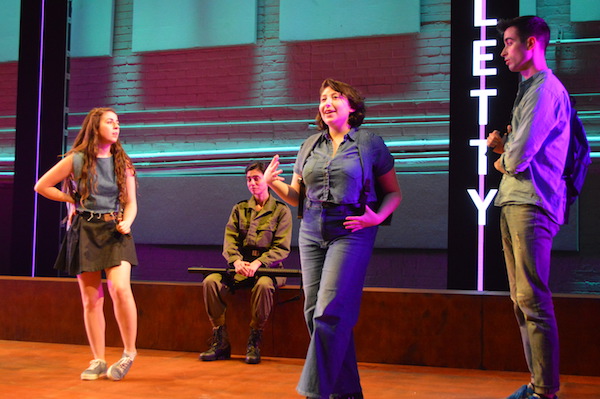
BY TRAV S.D. | How soon is “too soon” — are 2,000 years enough? Probably not when you’re talking about the mass suicide at Masada (73 CE) or the Jewish Holocaust during the Third Reich. Yet in “Diaspora” (playing at The Gym at Judson through Dec. 23), playwright Nathaniel Sam Shapiro tackles both of these subjects, filtered through the eyes and experiences of callow American Jewish youth on a Birthright-type cultural legacy tour of Israel.
“Diaspora” pendulates between hilarious and heartbreaking, often within a single scene. The show juxtaposes scenes of college kids hooking up, getting high, and generally complaining about their lives as they ride on a tour bus, with exchanges between characters in the last days of the historical Masada, where, according to the traditional telling, nearly 1,000 Jews burned themselves alive rather than allow themselves to be captured by their Roman persecutors.
“My first encounter with the Masada story was as a kid,” said Shapiro. “It bothered me. I found it off-putting. Subject matter like that engenders a strong response and gives the metaphor a relevance. Masada was the last bastion of the Jewish Revolt and, in a way, precipitated the diaspora into Europe. I feel like a metaphor was already there for me, easy to relate to the contemporary politics of Israel. The Likud and Netanyahu are all about walling themselves up, a feeling that the world is out to get you, that you can only rely on yourself.”
The ignorance of the young people in the play about their own history, and their emotional distance from it, is frequently shocking. Shapiro says his character research included interviewing people who have visited Israel and Palestine, and observations of youngsters on actual Birthright trips around the country. As for the Masada research, there were the works of Josephus (ca. 37-100), the only contemporary account, and Nachman Ben-Yehuda’s “The Masada Myth.”
“Josephus was kind of the Benedict Arnold of the Jewish Revolt,” explained Shapiro. “He was writing for a Greco-Roman audience, the prevailing worldview at the time. So there are doubts as to its accuracy. But for understanding how people saw themselves at the time, it’s invaluable.”

Added perspective on the subject matter is provided by the play’s director, Nairobi-born Saheem Ali. “Nathaniel and I met as graduate students at NYU,” recalled Ali. “Nathaniel had written a piece called ‘The Erlkings,’ about the Columbine shooting, and needed a director for it. I was impressed by how he fashioned existing documents, FBI reports, and so forth into a work of theatre. So we formed a working relationship.”
“The Erlkings” was produced on Theatre Row in 2014. “Diaspora” is their second collaboration — and according to Ali, it’s been as much a learning experience as an act of expression.
“Nathaniel gave me my introduction to this culture,” said Ali. “I grew up in Kenya. I didn’t meet any Jews until 1998. I experienced a good deal of enlightenment, working on this play. I really relied on him for cultural perspective, and the fact that he’s so research-oriented. Nathaniel’s writing about these human experiences provides the entry point. I provide the theatrical interpretation.”
“Saheem helps provide an outside perspective that is a key in communicating with a broader audience,” added Shapiro. “You could get lost in insider knowledge and references. It’s helpful having someone who can question things.”
As for approaching the topic with satirical humor, Shapiro said, “I hope to be in the tradition of many of my Jewish heroes who use humor to communicate stories of oppression and pain. More generally, humor is an amazing tool. There is something about laughter that involves you. There is something to be gained from exploring uncomfortable moments. When some of these characters take some of these awful events lightly, for us to find it funny, you have to acknowledge how horrible it is. Someone who didn’t find it horrible wouldn’t find it funny.”
“Diaspora” is the inaugural production of Shapiro’s new producing organization, Red Moon Theater Company. Through Dec. 23. At 2pm, 3pm, 7pm or 8pm depending on the specific Tues.-Sun. performance. At The Gym at Judson (243 Thompson St., btw. W. Third St. & Washington Sq. South). For tickets ($55.50-$79.50), call 866-811-4111 or visit diasporatheplay.com. Follow “Diaspora” on Twitter, Instagram and Facebook at @diasporatheplay.


















